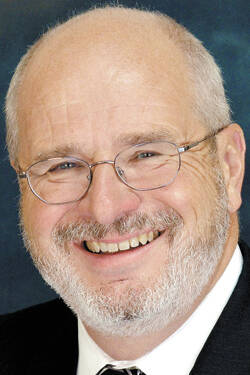Todd Young waged a lonely battle the other day.
On Sept. 11, the Republican senior U.S. senator from Indiana delivered the Constitution Day convocation talk at Franklin College. Mindful of the date’s significance and the setting, Young spoke about the ways the terrorist acts on Sept. 11, 2001, were an assault on constitutional principles and the role Founding Father Benjamin Franklin—the inspiration for the college’s name—played in shaping those principles.
The senator could have chosen to deliver the sort of “up with people” talk commonplace on such occasions.
Instead, the talk Young gave was more substantive—and, in some ways, surprising.
The surprises started early. Near the beginning of his talk, Young spoke of the threats that the grand American experiment in representative democracy faces.
“No foreign army, however mighty, will ever destroy it,” he said.
Then came the first eye-opener in his talk.
“Our Constitution’s greatest tests will always come from within…when society-wide transformations stress our system and cast doubt on our long-held values,” Young said.
Although the senator never spoke Donald Trump’s name, the allusion to the former president and the many challenges he presents to constitutional governance was clear. Even though he referenced the terrorists who attacked the World Trade Center and the Pentagon 22 years ago and our intensifying economic rivalry with China, Young did not refer to either as our greatest threat.
No, the greatest threat to our nation, he argued, is … us.
Young’s proposed defense against that threat was just as surprising.
He said we needed more figures like Ben Franklin in leadership and in our midst.
Perhaps not surprisingly, I have an abiding fondness for old Ben. He was, by far, the earthiest and most approachable of this nation’s founders, a man who, as a printer, worked as comfortably with his hands as he did with many of the rarified ideas of the Enlightenment.
I can imagine marching behind George Washington. I also can envision craning my neck to listen to words of wisdom from Thomas Jefferson and James Madison—both of whom spoke very softly.
Franklin, though, is the only one with whom I can picture myself sharing a beer or a laugh.
That said, the virtues Franklin possessed—his devotion to reason and scientific inquiry, his determination to understand and respect all points of view, his pragmatism—likely would make him a pariah in political circles these days.
Those virtues, which Young justly touted, not only helped America win its independence—it was through Franklin’s diplomacy that France became our ally in the conflict, which tipped the balance in our favor—but also helped ease the fledgling nation’s birth pains at key moments.
It was Franklin’s placating voice that calmed Jefferson’s pique over changes made to the latter’s first draft of the Declaration of Independence. And it was Franklin’s steadying presence that encouraged the drafters of the Constitution to seek out compromises—some inspired, some tragic—to the thorny disputes separating the young states.
Those Franklin qualities now would render him suspect in a political and cultural environment in which showing even a modicum of respect for differing opinions is viewed as either heresy or apostasy. He would be labeled either a RINO (Republican In Name Only) or DINO (you can figure that one out).
Young’s implied argument was that we Americans are poorer for this.
He’s right about that.
The point of the system of self-government Franklin championed wasn’t to produce winners and losers. Rather, it was to set up a structure in which different people with different backgrounds from different parts of the country could resolve differences and figure out ways to live and work together.
That sense of purpose we seem to have lost entirely.
Now, in addition to not being able to compromise with each other, we also seem not to be able to even listen to each other.
As he neared his close, Young said that “we need more of Franklin’s spirit in our nation.”
That is true.
One way to recover that spirit would be to do an honest accounting of how we lost it in the first place.
Ben Franklin was unflinching in one important way.
He never feared facing the truth.
The truth was, Franklin believed, the only path forward.
John Krull is director of Franklin College’s Pulliam School of Journalism and publisher of TheStatehouseFile.com, a news website powered by Franklin College journalism students. The views expressed are those of the author only and should not be attributed to Franklin College. Send comments to [email protected].





